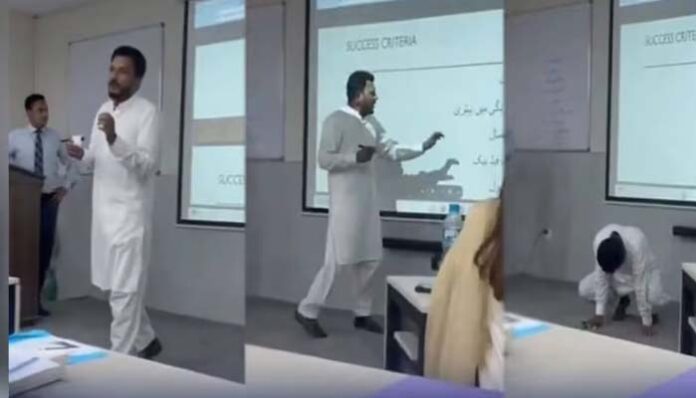During a routine professional training session at Crescent Model School, 36‑year‑old Urdu instructor Niaz Ahmed suddenly clutched his chest and collapsed to the floor. Colleagues and trainees rushed to his side before he was whisked to a nearby hospital, where doctors pronounced him dead from cardiac arrest shortly thereafter dailythedestination.com.
Sudden Collapse and Viral Video
The entire episode was captured on a classroom camera and quickly spread across social media platforms. Within hours, the harrowing footage of Ahmed’s collapse and the frantic efforts to save him had gone viral, leaving viewers across Pakistan in shock. Many users expressed horror at the scene, while others lamented the lack of immediate medical support in schools thecurrent.pk.
Immediate Medical Response
Witnesses report that Ahmed first complained of sharp chest discomfort just minutes into his lecture. Staff members called emergency services and performed basic life‑support measures while awaiting ambulance arrival. Despite their efforts, doctors at the hospital confirmed that the teacher had suffered a massive heart attack, which led to irreversible cardiac arrest dailythedestination.com.
Community Grief and Condolences
News of Ahmed’s passing prompted an outpouring of grief from students, fellow teachers, and the wider educational community. Classmates shared memories of his patient teaching style and genuine concern for each pupil’s progress. Online tributes noted his dedication to Urdu instruction and his warm rapport with middle‑school learners mmnews.tv.
Moreover, many social media users used the incident to highlight the pressures faced by educators. Comments called for routine health screenings and stress‑management support for teachers, arguing that instructional staff often work long hours under significant strain without adequate safeguards dailythedestination.com.
Cardiac Health Risks in Pakistan
Sudden cardiac arrest among relatively young adults has drawn national concern in recent years. Medical experts point out that underlying conditions—such as undiagnosed hypertension or high cholesterol—can go unnoticed without regular checkups. In the wake of Ahmed’s death, health advocates stressed the importance of equipping schools with automated external defibrillators (AEDs) and training staff in emergency response thecurrent.pk.
Calls for Policy Change
Following this tragedy, educators’ unions and parent‑teacher associations have renewed demands for mandatory health assessments of all school personnel. They argue that a simple electrocardiogram (ECG) and blood‑pressure screening could identify at‑risk individuals before a catastrophic event. Meanwhile, some school administrations have begun reviewing their emergency protocols to ensure faster medical intervention in future incidents thecurrent.pk.
Personal Analysis
It is heartbreaking to see a devoted teacher lose his life mid‑lecture, and the viral nature of the video only amplifies that pain. From my perspective, this incident underscores a gap in our educational infrastructure: we celebrate educators’ commitment while oftentimes neglecting their own wellbeing. If we truly value those who shape young minds, we must invest in their health—starting with simple, proactive measures like routine screenings and emergency training. Only then can we prevent another tragedy from unfolding in what should be a safe learning environment.

